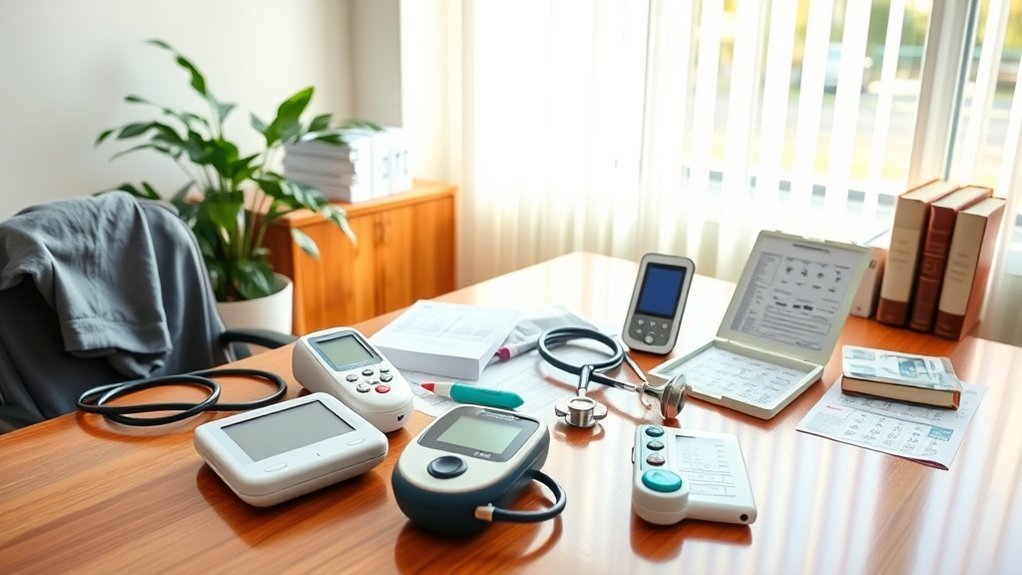Screening tests play an essential role in identifying health issues early, but you might have questions about their importance and application. Who should get screened? How often? And what should you expect during the process? Understanding these aspects can help you make informed decisions about your health. As we explore these frequently asked questions, you’ll gain insight into steering your screening needs and addressing any misconceptions.
What Are Screening Tests and Their Purpose?
Screening tests play a crucial role in early detection and prevention of diseases. They’re designed to identify health issues before symptoms appear, allowing for timely intervention. By participating in these tests, you take a proactive step in managing your health.
They can reveal potential risks or conditions that may develop into more serious problems later on.
The primary purpose of screening tests is to catch diseases early when they’re often more treatable. This not only improves your chances of successful treatment but can also reduce healthcare costs in the long run.
It’s essential to discuss with your healthcare provider which tests are appropriate for you based on your age, family history, and lifestyle.
Types of Screening Tests Available
While various types of screening tests exist, each serves a unique purpose in evaluating your health. Common tests include blood pressure screenings, which help assess your risk for heart disease. Cholesterol tests measure your lipid levels, indicating potential cardiovascular issues.
Additionally, mammograms are vital for early breast cancer detection, while Pap smears are essential for cervical cancer screening. Colonoscopies identify colorectal cancer risks and polyps, while diabetes screenings check blood sugar levels.
Finally, skin exams can detect unusual moles or skin changes that may indicate cancer. Understanding these tests can empower you to take charge of your health and make informed decisions about your screening needs.
Always consult with your healthcare provider to determine which tests are right for you.
Who Should Get Screened and When?
When should you consider getting screened for health issues? Timing and personal factors play crucial roles in determining when to undergo screening.
Generally, you should think about screening if:
- You have a family history of specific diseases, like cancer or heart disease.
- You’re reaching important age milestones, such as 40 for mammograms or 50 for colonoscopies.
- You experience symptoms or changes in your health, even if they seem minor.
Consult with your healthcare provider to tailor your screening schedule based on your unique health profile.
Regular screenings can catch issues early, often leading to better outcomes. Remember, being proactive about your health is one of the best decisions you can make!
How to Interpret Screening Test Results
Understanding your screening test results is just as important as getting screened in the first place. When you receive your results, focus on the key terms: positive and negative. A positive result often means further investigation is necessary, but it doesn’t always indicate a serious condition.
Conversely, a negative result usually suggests you’re at lower risk, but it’s not a guarantee that everything’s fine.
Always consider the context of your overall health and risk factors. Discuss your results with your healthcare provider; they can clarify what they mean for you specifically.
Consider your overall health and risk factors when interpreting results; consult your healthcare provider for personalized clarity.
Remember that screening tests are just one tool in your healthcare toolbox, and interpreting them accurately helps you make informed decisions about your health.
Common Misconceptions About Screening Tests
Many people hold misconceptions about screening tests that can lead to confusion or unnecessary anxiety. Understanding the truth behind these myths can help you make informed decisions about your health.
Here are some common misconceptions:
- All screening tests are 100% accurate: No test is infallible; false positives and negatives can occur.
- Screening tests replace regular check-ups: These tests are just one part of a thorough healthcare plan and shouldn’t substitute for routine visits.
- You should get screened for everything: Recommendations vary based on age, family history, and risk factors, so consult your healthcare provider for personalized advice.
Frequently Asked Questions
Are Screening Tests Covered by Health Insurance Plans?
Yes, most health insurance plans cover screening tests, but coverage varies by plan and type of test. You should check with your provider to understand your specific coverage and any costs you might incur.
Can I Request a Screening Test Without a Doctor’s Referral?
Yes, you can request a screening test without a doctor’s referral, depending on the specific test and your insurance plan. However, it’s wise to check with your provider to avoid unexpected costs.
What Are the Risks Associated With Screening Tests?
Screening tests can sometimes lead to false positives, causing unnecessary anxiety. For example, if a mammogram indicates potential cancer, it might result in invasive procedures that aren’t needed. It’s vital to weigh these risks before proceeding.
How Accurate Are Screening Tests in Detecting Conditions?
Screening tests vary in accuracy depending on the condition and test type. While many are effective, false positives and negatives can occur, so it’s essential to discuss results with your healthcare provider for proper interpretation.
Can Lifestyle Changes Affect Screening Test Results?
Absolutely, your lifestyle choices can sway screening test results. By nurturing healthier habits, like eating well and exercising, you might just enhance your body’s performance and improve those test outcomes. It’s all connected!
Conclusion
To sum up, understanding screening tests can empower you to take charge of your health. For instance, consider Sarah, who discovered early-stage breast cancer through a routine mammogram. Early detection allowed her to pursue treatment and improve her prognosis greatly. By knowing your screening needs and addressing any concerns with your healthcare provider, you can make informed decisions that benefit your health in the long run. Don’t wait—take that proactive step towards a healthier future!
